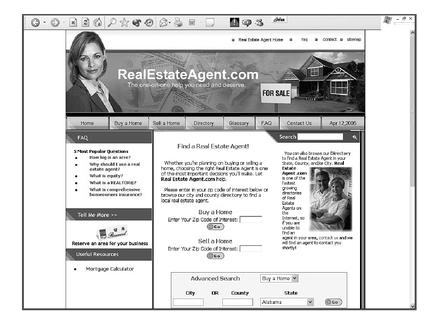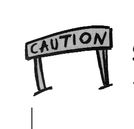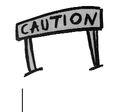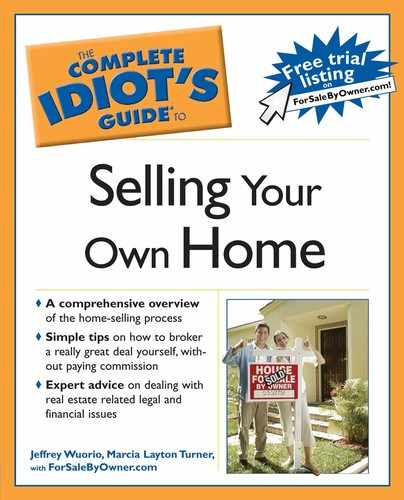Chapter 21
Bailing Out—Opting for an Agent
In This Chapter
• Signs you may benefit from an agent
• I just need a little help
• Know your agreement options
• Be sure to share all you’ve learned
Hopefully, this is the only chapter in this book you will never, ever have to put to use. But in the interest of being thorough …
Like most everything else in life, selling your home on your own is by no means a sure thing. Granted, in this book we’ve tried to give you every possible tool to ensure your success. But for one reason or another, not every home is built to sell quickly or at the best possible price—FSBO or otherwise.
By the same token, you may immerse yourself in the process to a certain degree, only to discover it simply isn’t your cup of tea. Or that you don’t have the time. Or that you’re tired of dealing one-on-one with buyers who would make saints grit their teeth.
Whatever the reason, you’re giving some thought to using a real estate agent to help sell your home, at least in some capacity. Although we sincerely hope the following information proves unnecessary to you—however enlightening—here are some strategies to bear in mind when you suspect the sale of your home would benefit from the presence and skill of a professional agent.

Selling Smarts
Before we get into the meat of the issue, giving some thought to bringing an agent on board shouldn’t be equated with failure. As you’ve no doubt learned, selling your home successfully hinges on a number of factors—some under your control, many that are not. There are simply too many factors in the mix to warrant any sort of guilt trip. Remember: the goal is to sell your house.
When to Bail—Signs That It Won’t Go
The idea can occur to you at almost any point in the process of selling your home. Maybe you’ve only been at it for a little while, perhaps you’ve been working hard for quite some time. Regardless of when it happens, a slightly unnerving thought hits you: This just doesn’t seem to be working out. My house just doesn’t seem to be selling.
Obviously, the notion that you may do well to opt for Plan B is a highly subjective one. What one homeowner would consider maddeningly frustrating another would only see as mildly inconvenient if, indeed, nothing more than a challenge.

Selling Smarts
A refresher: one of the first questions a buyer will ask is how long a home has been on the market. The longer the timeframe, the greater a buyer’s suspicions about why it hasn’t sold—and why they may not be interested as well. Moreover, it only gets worse the longer the home stays on the market.
Still, there are some rather universal signs that suggest the sale of your home isn’t necessarily bound for utter success, and you may want to consider your options. Here are a few to consider:
• Time on the market. This is very subjective sign, indeed, one that will vary according to the dynamics of the local marketplace. But as a general rule of thumb, if your home has been for sale for more than a few months, it would be wise to rethink what you’ve been doing. For many, six months without a sale is a sure sign that what you’ve been trying so far isn’t working.
• Time with little or no buyer traffic. Maybe you started out with a steady stream of prospective buyers, but now a buyer calling for a look is fast becoming the exception rather than the rule.
• No one seems to be qualified. A variant on the prior problem. You’re seemingly getting enough interested parties, but they all inevitably turn out to be incapable of buying your home. (This can be a sign of a poor marketing strategy—attracting the wrong types of buyers—or a home that is simply priced out of its league.)
• You sense that some buyers are antsy without an agent in the picture. We warned you about this earlier and, although attitudes are changing, there are still some buyers who are apprehensive about dealing directly with an owner.
• You’ve had a couple of deals fall through. Here, you accepted offers, only to have the sale fall apart for any number of reasons—perhaps something was uncovered during the home inspection, or some other point of follow up negotiation nixed the sale. In any case, you’ve experienced the frustration of coming close without closing.
• You’ve made some paperwork mistakes. Hopefully, the guidance offered in this book makes this a distant possibility but, if it does occur, this is a good argument in favor of having someone else help you with the necessary documentation.
• You have to move more quickly than you originally expected. Not so much a problem as a change in circumstances. In this case, a new job or some other obligation in another location requires your presence sooner than you anticipated, making it necessary to sell your home faster than you planned.
• You’ve found a new home you simply can’t live without. Ditto the dynamics of the prior scenario. You’ve got to sell your current home in the fastest way possible or you’ll lose out on your dream home.
Any number of other possibilities exist, but the bottom line is a common one—selling your home simply has not gone the way you expected and hoped it would. And it seems to you that working with a real estate agent in some capacity might be your best option.
We covered the various advantages and drawbacks of working with a real estate agent back in Chapter 1. The advantages include contacts, experience with real estate in your area, and marketing savvy, among others.

Selling Smarts
If you’re considering working with an agent in some way, it can be helpful to think back and try to identify just what didn’t measure up with your FSBO. Was it the price, marketing, advertising, negotiation, or some other problem? Pinpointing what you think went awry can help you identify the sort of agent you want to work with as well as how you think you may be able to work with him most effectively.
How to Find the Right Agent
Even if you’re merely considering the possibility of working with an agent, it’s important to know how to partner with one who will serve your needs.
The first issue is where to start. One reliable way is to ask for referrals from friends, relatives, and colleagues. The reasoning here is that they have worked with an agent in the past with whom they’ve been happy and feel confident in recommending.
One possible pitfall in obtaining referrals is that others’ homes may be substantially different from yours. For instance, your friend’s house may be quite a bit more expensive than yours or vice versa—or it may be set in the country while yours is in a subdivision. So it’s a good idea to try to pick the brain of someone whose home is, at the very least, somewhat similar to yours.
Another resource is a variety of regional and national associations dealing with real estate agents, for example, www.realestateagent.com (see the following figure). We provide additional websites at the conclusion of this chapter that offer search engines to pair you up with an agent who works in your area.
Another way to get a lead on solid agents in your area is to drive around and look for listing signs on front lawns. If you see a name over and over, that means that particular agent is, if nothing else, busy. While this doesn’t necessarily indicate the agent who’s best for you, it’s at least a reasonable indicator warranting further investigation.
After you have a lead on several candidates, it’s essential to meet with them to get to know their approach and credentials. That means a face-to-face meeting with each—loaded with some pointed questions that should give you a good idea about who will work and who won’t.

Search engines, such as this one at Realestateagent.com, let you find agents working in your area.
Here’s a lineup of suggested questions that can prove helpful in getting not just a good agent, but the right one for you—one who may be willing to take a former FSBO into consideration:
• Have them outline their experience, particularly local. How long have they worked in the area where your home is located?
• Have them review any special designations or training they may have received. Also professional memberships and associations.
• How many deals have they actually closed—not working on, but done and finished—during the past two months or so?

Selling Smarts
The list of questions here are anything but run of the mill, stereotypical, tell-me-about-yourself questions. They’re carefully worded to lead you to your next step—considering what type of arrangement you can work out with a real estate agent.
• Have they always worked as a real estate agent? If not, then what other experience might they have? (This is an excellent way to uncover skills and other traits that may prove helpful.)
• What is their ratio of buyers represented to sellers represented? (Some agents are particularly good or more comfortable with one or the other.)
• How do you cancel whatever relationship you may have with the agent if you’re not satisfied?
• Have them offer their opinion of people who try to sell their homes without an agent. This can be very telling. Many real estate agents are very understanding that people want to save money any way they can. Others, on the other hand, may resent anyone’s perceived intrusion on their livelihood. If you get that feeling with an agent, it may be hard to work with him—particularly if you try to work out an alternative arrangement.
• What is their standard fee or commission?
• Has the agent ever agreed to some sort of alternative agreement with a seller? If so, what were the details of that?
Like any sort of interview process, it’s always important to obtain and check into a few references. In your case, try to find a client who initially attempted to sell his home by himself, then opted for the agent. Find out how the experience went and if he would do the same thing again.
Asking for Help, Not a Listing
The preceding list of questions has two primary objectives. The first is to find an agent who’s qualified, experienced in selling homes such as yours, and sufficiently aggressive to offer a good chance of success.
The second point is determining whether an agent is agreeable to arrangements that fall outside the conventional, full-fee listing. Know upfront when you approach a real estate agent that—regardless of whether you’re a FSBO or otherwise—he’s going to want to sign your house on for a full listing.
That’s understandable. Real estate agents, like everyone else, are trying to earn a good living in a very competitive environment. Never fault them for wanting a deal that offers the best paycheck they can reasonably get.
The downside for you, of course, is the 6 to 7 percent commission that attaches itself to conventional listing services. As we’ve reviewed before, that can prove a tidy sum—and, the more expensive the home, the greater the commission cut.

Sales Snafu
When considering a full-service agent, bear in mind the problem of a sudden jump in the asking price of your home. That’s not because the house has suddenly soared in value—rather, you may choose to try upping the price to offset the expense of the sales commission. That can raise eyebrows from buyers who may remember a lower FSBO price. In the end, with a full-service agent, you may have to settle for pocketing less than you originally hoped for.
If the cost of a sales commission seems a reasonable price to pay, go for it. After all, that only becomes an issue if your house is sold—and that’s the whole point of putting your home on the market in the first place.
But you may wish to pursue other options. Start by asking for an agent’s help, not necessarily a listing, at least at first. If you have a friend or relative who’s an agent—or, by chance, you found a sympathetic agent through your course of interviews—ask them to critique what you’ve done so far. That may offer additional insight into how your FSBO may have misfired and, in turn, how an agent may be able to best assist you from here on.
Things being what they are, don’t expect a friendly agent to necessarily tell you everything you need to know to revive your FSBO. One contact for this book reports that many agents are rather prudent in what information they’re willing to share with any prospective client, let alone a FSBO. An agent may give you just enough information to whet your appetite and underscore her credentials, but not so much that you can necessarily proceed on your own. Understandably, they’d prefer the listing.
It never hurts to inquire about financial arrangements other than the going sales commission cut. Look back at some of the issues relating to agents in Chapter 1—it’s possible an agent has, on occasion, trimmed his fee to get an appealing home. Many agents are open to cutting their commission up to 1 percent or so. Not exactly a windfall, but every little bit makes a difference.
Few, if any, solid agents will be willing to consider a flat fee in lieu of a percentage-based sales commission. Understandably, there’s simply insufficient financial incentive to warrant their time and energy. As we mentioned in Chapter 1, there are so-called “discount” brokers who operate fee-based services. But their services can be notoriously uneven.
One of the pluses you bring to the challenge of working out some sort of alternative arrangement with an agent is your experience in attempting to sell your home on your own. For one thing, you likely know more about your home than many other homeowners (see the following section on helping your agent.) On top of that, you may have research, information, or available materials so she doesn’t have to compile them from square one.
These and other advantages may make you a particularly attractive client for many agents—and, in turn, make them more amenable to trimming down their conventional commission. So in chatting with agents, play up all that you, as an experienced FSBO, may be able to bring to the relationship. It may make the agent’s job a good deal less challenging and a better fit to a lower commission.

Selling Smarts
Once more, keep local conditions in mind when pursuing alternative commission arrangements. A hot market where homes are selling quickly may prompt agents to discount their commission. A lesser paycheck but, hopefully, for less effort. On the other hand, a slow market where agents are struggling to move houses may mandate full commissions. The reasoning would be that a tough market requires a greater amount of time and effort.
One way to leverage all that you may already have in place is to offer a relatively modest cut to any broker who brings you a buyer—a finder’s fee of sorts ranging from 2 to 4 percent. Position this approach by pointing out what steps you have taken to date—including advertisements, listings, marketing, and other efforts—and that you’d be happy to compensate any agent who provides you with a qualified buyer.
Another way to entice agents toward a lower commission is the prospect of work beyond just selling your home. If you know of other homeowners who may be on the lookout for an agent, mention that you’d be happy to pass his name along. Moreover, don’t forget yourself. If you’re buying a new home after selling this one, you’ll need a good agent to help see that through, right?
One final possibility breaks the commission structure down according to the price of your home. Some agents may be willing to charge a certain commission rate for, say, the first $100,000 or $150,000 of the price and then a discounted rate for any amount beyond that. The obvious drawback is that this arrangement is only workable with more expensive homes.
Business As Usual? Agent Agreement Options
Another part of the relationship between seller and an agent is the formal agreement that outlines their relationship. This is known as the listing agreement.
There are basically two types of listing agreements—an exclusive agreement and an open listing. An exclusive agreement breaks down into two subcategories—the exclusive right to sell and an exclusive agency. The exclusive right to sell is by far the most advantageous to the real estate agent and agency. This guarantees that your agent is going to get his commission no matter how the property is actually sold. In return, the exclusive right to sell requires the agency to actively promote the sale of your home.

Tools of the Trade
A listing agreement defines various aspects of a real estate agent’s work with a seller. Details include commission rates, how long the listing will remain in place, who gets paid under various circumstances, and other information. Once signed, this is a binding contract.
If you break down the exclusive right to sell a bit, it’s easy to see why this is the agent’s arrangement of choice. Say you sign the agreement with the agent. The next day, a buyer who looked at your home back when you were trying to sell it on your own appears and offers the full purchase price. Your agent—who may have done little more than hand you the pen to sign the listing agreement—gets his commission. Nice work if you can get it.
The exclusive agency arrangement narrows this somewhat, but not by much. Here, the only time the agent doesn’t get paid is if you find the buyer yourself. Under any other circumstances, the full commission is paid.
The second option is known as the open listing. Here, the dynamics are in your favor. Under this contract, the only time your agent earns her full commission is if she, herself, finds the buyer. Anything else—nada.
It’s no great revelation that real estate agents avoid an open listing at every foreseeable turn. Not only does it offer the least chance of actually earning a commission, it also lets you list your home with other real estate agencies at the same time—and, for that matter, to continue to try to sell your home on your own.
That said, an open listing is one you should pursue when working out your listing agreement with your agent. It combines the best of both worlds—the resources of a professional agent along with the continued possibility that you may sell your home without the agent and save the commission in the long run.

Selling Smarts
Try to gauge how your agent will react to working under an open listing. Some may take it as added incentive to work particularly hard to earn their commission. Others may not go too far out of their way to sell your home, reasoning that the odds are stacked against them. In that case, you may end up saddling yourself with an agent who, in the end, may do little to help move your house.
Other elements of the listing arrangement warrant your attention. These include:
• Length of the agreement. Many agencies will push for terms as long as six months, reasoning that the law of averages will produce a buyer within half a year. Unfortunately, that can limit how aggressive they may be in trying to sell your home. Look for shorter terms, such as 60 or 90 days.
• When the commission must be paid. Make sure your listing stipulates that any commissions will be paid when the sale is completed and you have the money in hand. Some arrangements set payment at the time an offer to purchase is signed.
• Who’s responsible for advertising and marketing expenses. This should be your agent’s responsibility, not yours.
Have your attorney review any listing agreement before you sign it. For one thing, she’ll be aware of local legal limitations or customs that may impact the agreement. Also, she should make sure the contract contains clear provisions that allow you to terminate the arrangement. For instance, many contracts really don’t mention any specific responsibilities that an agent must perform, such as hosting open houses, advertising the home in the local paper, and other duties. These should be spelled out. If unfulfilled, they should also be mentioned as a justifiable cause to cancel the listing.
Helping Your Agent with What You Know
As we’ve mentioned, you’re going to be unlike most sellers an agent works with. Because you’ve put the time and effort into attempting to sell your home on your own, chances are good you’ll know more about your home than other buyers—and, in the process, prove a valuable resource for your real estate agent.
If you followed our suggested agent interview questions listed earlier in this chapter, chances are also very good that you’ve paired with an agent who has a certain degree of respect for the experience and insight you’ve acquired. Ultimately, that should lead to a working relationship that’s more of a partnership instead of your agent telling you what to do at every single turn.
So, don’t be the least bit shy about sharing any knowledge or experience you may have picked up along the way that you think may be of use to your agent. Notice that open houses got a better turnout on a Sunday instead of a Saturday? Mention that. Did you find that buyers seemed particularly drawn to the features of your kitchen and less so to the family room? Suggest that tours with prospective buyers play that up as well.
The point here is that you can bring more to the table than many other owners—information and perspective that your agent can use to his decided advantage. Moreover, don’t limit it to your personal experience. If you have any materials—sales flyers, research, and other items—that you thought were helpful, be sure to pass those along as well.

Sales Snafu
It’s helpful to be as involved in the sale of your home as possible. But don’t go overboard to the point of monitoring your agent’s every single move. Even the most open agent will begin to resent a seller who can’t seem to tell the difference between involved and intrusive. And any bad feelings between you and your agent will only hinder the sale of your home.
Not only can your experience as a FSBO prove helpful to your agent, it also makes you a more informed consumer. Because you have a particular appreciation for what goes into the successful sale of a home, you also are aware of what you can reasonably expect a competent agent to do on your behalf. And, in the end, that can only contribute to your ultimate goal—the sale of your home with a fair profit in your pocket.
Online Resources for Choosing an Agent
Here are a few websites that can prove helpful in selecting and working with a real estate agent:
• Realestateagent.com (www.realestateagent.com) lets you search for local real estate agents using your zip code. It’s also a useful source for other real estate-related information.
• Another excellent source for finding an agent is at: www.realestate.com. It also serves as a handy starting point for information about refinancing and other financial details.
• Another excellent starting point for identifying and finding a solid agent is located at: www.ewoss.com/search.aspx?k=real+estate+agents&s=5.
The Least You Need to Know
• Get to know certain warning signs that suggest your efforts to sell your home may benefit from an agent. Some of the more obvious ones are a long time on the market without a sale or dwindling buyer traffic.
• Interview agents aggressively. In particular, find out how they feel about sellers who first tried to sell their homes themselves.
• Try to negotiate commission structures. See if they’d be open to less expensive finder’s fee or other options that are less pricey than conventional commissions.
• Check your listing contract carefully. Avoid exclusive right to sell arrangements if at all possible. Also, check how long the contract will be in effect and what the agent is legally obligated to do on your behalf.
• Serve as a resource for your agent. Share what you’ve learned about your home so he ultimately can do a better job of selling it.
..................Content has been hidden....................
You can't read the all page of ebook, please click here login for view all page.
